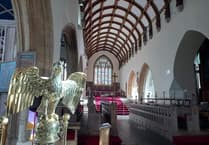Pembrokeshire County Council ended the last financial year underspending by £2m, in part due to an extra £1.2m raised through second homes tax, despite a dire forecast it was to overspend by £1.4m..
At the July 7 meeting of Pembrokeshire County Council’s Cabinet, members heard the council’s approved revenue net expenditure budget for 2024-25 was £303.5m, set against a backdrop of increased level of demand, complexity and cost of packages within its School ALN provision, Children’s Services, Adult Services and Homelessness, with material overspends within Social Care & Housing totalling £6.5m, offset by underspends in other service areas.
At the end of the financial year, the council’s net expenditure for 2024-25 was £301.5m, against a prediction during the third quarter of a £1.4m overspend, a report for members by Cabinet Member for Corporate Finance Efficiencies Cllr Alistair Cameron said.
That £3.4m difference was due to a number of factors, members heard, including £1.8m of additional revenue funding and £0.7m additional capital funding from Welsh Government for the 2024-25 financial year received this March.
The report for members added: “A recruitment freeze was implemented following Q1 reporting, with recruitment only to essential positions. The recruitment market remains challenging, with many services struggling to recruit suitably qualified and skilled staff. Whilst this has resulted in a reduction in budgetary pressures of circa £2.4m, it will impact the ability of Pembrokeshire County Council to deliver its services.”
The council’s budget has also been bolstered by an underspend of £4.3m in Capital Financing Costs and Investment Income, along with “a moratorium on all nonessential expenditure” put in place during the first quarter of the year, along with early preparation for, and progression of the 2025-26 budget savings resulting in some additional savings being realised in 2024-25.
It also said the second homes council tax premium had netted an unexpected extra £1.2m for the council, with properties moving from Non-Domestic Rates and qualifying for Second Home Council Tax premium as a result of not meeting the required 182-day occupancy threshold.
It warned: “There is a risk that a number of these customers may lodge a successful appeal with the Valuation Office Agency (VOA) and be moved back to NDR, requiring a repayment of the counciltax paid.
“The VOA have advised they currently have a 6-12-month backlog for appeals. It would be prudent for the £1.2m surplus to be held in reserve for likely refunds following VOA determination, and this is recommended.”
On schools, members heard that while the overall position had improved since the previous quarter, 13 schools remained in deficit balances.
Cllr Cameron warned the underspend “must not be used to mask the financial challenges in the medium-term financial plan”.
Cabinet Member for Residents’ Services Cllr Rhys Sinnett said: “It’s easy to look at social media and think things are collapsing around us; we have services that are seriously stretched, and we continue to deliver.”
After praising the work of council staff, Cllr Sinnett said: “I’m asking people for patience and some dialogue about what we are and what we are able to do; it’s tough out there for members and staff.”
Leader Cllr Jon Harvey said there was “quite alarming” misinformation on social media about efforts made, adding: “We’ve cut to the bone, and beyond, for most departments.”
Members agreed to note the report and the £2.014m budget underspend went to the Initiative Fund to provide resources for the council to invest in improvement and prevention projects for future cost avoidance / budget saving opportunities.
Members also agreed the £1.228m additional second homes council tax raised be held against any appeals.





Comments
This article has no comments yet. Be the first to leave a comment.